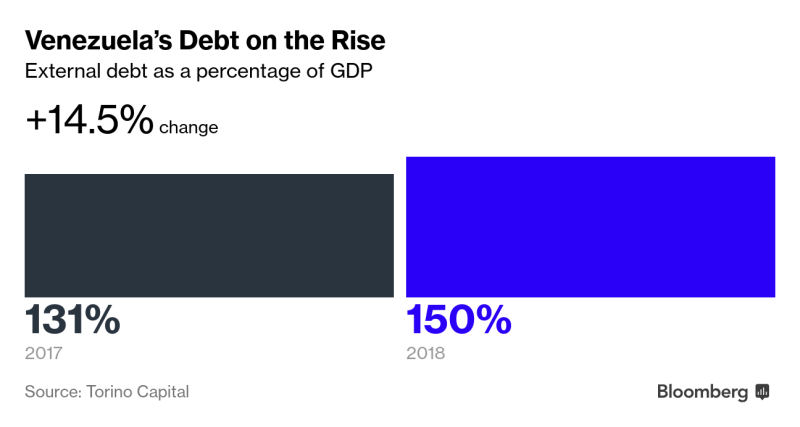


Venezuela’s Choking Points: Here’s Where Maduro Gets His Revenue
(Bloomberg)
-- The struggle for control of Venezuela is not only about securing the
military’s support or holding the streets. It is also about how much of
the country’s dwindling financial resources President Nicolas Maduro
can keep his hands on.
The
U.S., backed by Brazil, Canada and others, has recognized Juan Guaido,
the National Assembly leader, as Venezuela’s legitimate president, and
is trying to channel as much of the country’s income to him as possible.
The Trump administration tightened the screws with a de-facto block on
exports of Venezuelan oil to the U.S.
With
debt rising dramatically and reserves diminishing fast, following is a
snapshot of the Maduro administration’s financial lifelines.
OIL
Representing
the overwhelming majority of Venezuela’s income, oil production
plummeted to 1.22 million barrels per day in December, half the level of
three years ago. Assuming an average price of $52.12 for that month,
revenue would have totaled $1.86 billion. Output is expected to fall
another 33 percent in 2019, according to Fitch.The biggest takers of
Venezuelan crude in December were the U.S. (407,400 b/d), India (293,500
b/d), and China (238,700 b/d), according to fixture reports and
ship-tracking data compiled by Bloomberg.The U.S. on Monday announced
sanctions on Venezuela’s state-owned oil company PDVSA.Freezing of U.S.
and European accounts is likely to bring oil production to a standstill
and cause the economy to contract by 26.4 percent in 2019, Torino Chief
Economist Francisco Rodriguez wrote.
GOLD
Gold
reserves plunged to $5.45 billion in November from $6.76 billion in
July, and from $21.27 billion in Sept. 2011, according to Caracas
Capital, an investment bank and financial consultancy. It says the bulk
of the reserves are held by Venezuela itself.Accessing Venezuela’s gold
reserves overseas is becoming increasingly difficult for Maduro, as
shown by the Bank of England’s decision to deny a withdrawal request.
DEBT
Total
external debt in 2018 was $157 billion or 150 percent of GDP, up from
131 percent a year earlier, according to Torino Capital of New York, a
boutique investment firm.China has been a constant source of financing
for Venezuela, having lent some $70 billion, mostly against oil,
according to Asdrubal Oliveros, of Caracas-based Ecoanalitica. Torino
Capital estimates that Venezuela owes China $13.5 billion.
OTHER ASSETS
Citgo
Petroleum Corp., the Houston-based subsidiary of PDVSA, buys most of
Venezuela’s crude. U.S. Treasury Secretary Steven Mnuchin said Monday
that Citgo would be able to continue to operate but won’t be allowed to
remit money to the Maduro regime. Russia’s Rosneft has a 49.9% stake in
Citgo as collateral for a $1.5 billion loan.Vast amounts of oil revenue
are estimated to have been siphoned off PDVSA and parked abroad,
including in the U.S., Spain, and Russia.
TRADE, AID
The
biggest export markets for Venezuela are the U.S. (40.4%), China
(24.4%) and India (23.3%), Torino Economics figures show. Other top
trading partners include Mexico, Singapore and Spain.Foreign donors,
including the United Nations, have provided food aid and medicine.
Around 12 percent of the population is under-nourished.
--With assistance from Ben Bartenstein and Lisa Beyer.
To
contact the reporters on this story: Fabiola Zerpa in Caracas Office at
fzerpa@bloomberg.net;Hannah Recht in New York at hrecht@bloomberg.net
To
contact the editors responsible for this story: Vivianne Rodrigues at
vrodrigues3@bloomberg.net, ;Rosalind Mathieson at
rmathieson3@bloomberg.net, Raymond Colitt, Alan Crawford
For more articles like this, please visit us at bloomberg.com
No comments:
Post a Comment